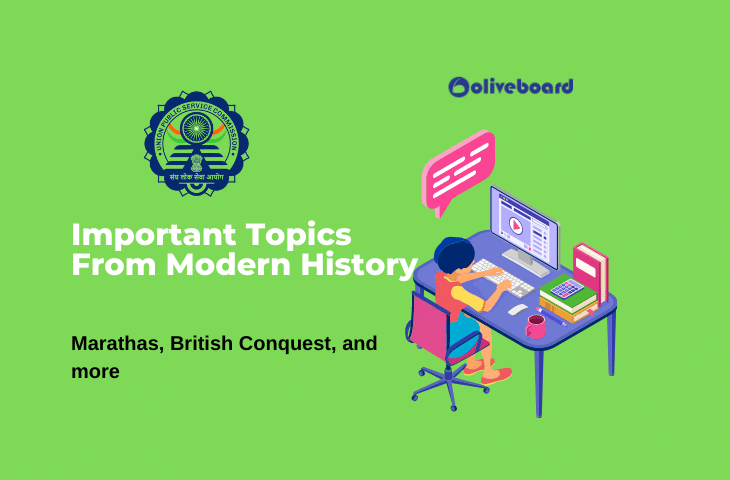Important Topics From Modern History
In India, the modern period began in the mid 18th century. India’s transition from medieval to modern age is said to have happened with the conquest of India by the British. The Mughal Empire lasted for over three centuries. Its decline in the first half of the 18th century led to an intense rivalry among the various ambitious powers to fill the political void. The struggle ended with the victory of the British, who then ruled India for about 200 years. This marked the beginning of the Modern Period in Indian History. Let’s discuss all the Important Topics from Modern History.

Decline Of The Mughal Empire
Aurangzeb was the last strong ruler of the Mughal dynasty. After his demise in the first decade of the 18th century, Mughal rule started to decline. Nine Mughal rulers, one after the other, ascended the throne after Aurangzeb, but none could save the falling empire. By 1857, Mughal rule officially came to an end and was followed by the territorial conquest and political domination of India by the English East India Company.
Marathas
During the Mughal reign, the Marathas under the strong leadership of their Peshwas emerged as a very strong contender for power. They had the power and potential to establish an all-India empire. Not only to the later Mughals, but they were a big threat to the emerging British power too. Marathas and the British fought three Anglo- Maratha Wars, from 1775 to 1818, and finally the British overpowered the Marathas.
Maratha Administration and rule of Peshwas are very Important Topics from Modern History.
European Powers Vs The British
Other than the British, there were other European powers like French, Portuguese, Dutch etc., who had their plans to dominate India but were finally overpowered by the British.
British Conquest
British did everything in its power to annex India. For that, they fought many wars with the emerging rivals and made a lot of conspiring policies in order to attain absolute rule. All these wars and policies are considered Important Topics from Modern History that helped the British to strengthen their rule.
Anglo-French Rivalry– Imperialistic ambitions of the French made their arch-rivals with the British in India. Three Carnatic wars were fought between them until the French bowed down.
Battle of Plassey (1757)– The battle of Plassey marked the transition of the English East India company from traders to the Kingmakers.
Battle of Buxar (1764)- With this battle, the Mughal emperor lost all his powers to the English East India company and just became the nominal head.
Anglo Mysore Wars– Four wars were fought, over the span of 32 years between the British and Hyder Ali and later his son, Tipu Sultan, to annex Mysore.
Anglo Maratha Wars– Three wars were fought between Marathas and the British, ultimately leading to Maratha’s collapse.
Anglo Sikh War- After two Anglo-Sikh wars, Punjab came under the British.
Subsidiary Alliance– Started as a friendly alliance with many princely states to provide them protection from internal and external turmoil. It later proved to be another way of peaceful annexation by the British.
Military conquest– The areas which did not surrender peacefully were taken by Military conquest.
Doctrine of Lapse– It was a conspiring policy in which a princely state was taken by the British if the king didn’t have a natural-born male heir.
Maladministration– Many states were forcefully taken by the British on the grounds of maladministration.
All these policies and wars helped the British to consolidate their power and helped them to emerge as the absolute ruler by 1856. These all policies and wars of the British conquest spree contribute as Important Topics from Modern History.
Governor generals like Robert Clive, Warren Hastings, Lord Cornwallis, Lord Wellesley, Lord Minto and Lord Dalhousie were the main contributors who helped in the annexation of India through their many policies and strong administration. Their detailed contributions are Important Topics from Modern History for various exams.
Revolt Of 1857
The policies attained by the British to conquer India were unjust, exploitative and oppressive in nature which slowly built up the anger and resentment among all the classes of Indians. This smouldering ember of frustration exploded and shook the very foundation of the British in the form of a great revolt, which was later termed the first war of Indian freedom. This revolt marked the end of company rule, and India directly came under the rule of the British queen. Due to its huge impact, this revolt is marked as one of the most Important Topics from Modern History.
British Policies After 1857
Economic Policies- Before the British, India had a good economy, and Indian textiles were in huge demand in Europe, but after the British monopoly on trade and economy, it was totally destroyed. The economic policies destructed our traditional trade and industry, and the whole economic profits were drained to England, thus leading us to more poverty and economic decline. Policies implemented by the British for the collection of revenues were:
- System of Auctioning lands
- The Permanent System
- The Ryotwari System
- The Mahalwari System
- The Commercial Policy
Educational Policy– The educational policies introduced by the British were all in their favour. In order to raise an English understanding working class for menial office jobs, they wanted to educate the Indians. To spread western education, they brought:
- The Charter Act
- Wood’s Despatch
Trade & Communication– To promote their industrial and commercial growth, the British developed the transport and communication system.
- Road Networks
- Railway Lines
- Telegraphs
- Steamships were introduced
Indian Renaissance
Raja Ram Mohan Roy– Termed as the Father of the Indian Renaissance, he advocated strongly for Women Education & Widow remarriages and started movements against the evil practices of:
- Sati Pratha
- Untouchability
- Child Marriage
- Polygamy
Ishwar Chandra Vidhyasagar– He too was an outstanding social and religious reformer. His works include-
- Campaigning against polygamy & child marriage
- First Indian school for girls in Calcutta (1849)
- Helped to bring Widow remarriage act in 1856
Dayanand Saraswati– Founded Arya Samaj in 1875 and worked against evil and irrational practices of Indian society.
Other than the above-mentioned leaders, Ramakrishna Paramhansa, Swami Vivekananda, Jyotiba Phule, Annie Besant, Dadabhai Naoroji, Sir Syed Ahmed Khan, Badruddin Tyabji too added vigour to the Indian renaissance movement. The work of each one of these social and religious reformers brought a fresh wave of rational thinking in the country, thus contributing greatly as Important Topics from Modern History.
The Indian National Movement
The Indian National Movement is divided into three phases. The key features and events of these phases are as follows:
Early Nationalist Phase ( 1885-1905)–
- The early nationalists were educated middle class like Dadabhai Naoroji, Gopal Krishna Gokhale, Surendra Nath Banerjee etc. They believed that British rule had several benefits. They didn’t want freedom from the British instantly; instead just needed some necessary reforms to suit the Indian subjects.
- These early nationalists formed the then Congress.
- They believed that self-government was a distant future.
Assertive Nationalist Phase (1905-1918)
- By the beginning of the 20th century, the leadership of Congress got passed into the hands of assertive nationalists.
- Leaders like Bal Gangadhar Tilak, Lala Lajpat Rai, Bipin Chandra Pal, Aurobindo Ghosh were some of the leaders of this phase.
- The leaders of this phase have no faith in British justice and a sense of fair play.
- They didn’t have faith in their reforms and believed that British Interests and Indian Interests were poles apart.
- They wanted immediate Swaraj (Independence).
- The nationalists adopted radical methods and, with the masses’ support, actively opposed and carried antigovernmental agitations.
- Bengal Split of 1905 was another major event of this phase. British had successfully divided Hindus and Muslim communities.
- Muslim league was formed in 1906.
- Home Rule Leagues– Two home rule leagues were formed in 1916, one by Tilak and the other by Annie Besant.
- The Lucknow Pact– Muslim League and Congress joined hands against a common enemy.
Gandhian Phase (1918-1947)
- After the Lucknow Pact, the British got alarmed and understood that repressive measures alone wouldn’t work. So they thought of granting some reforms to appease the nationalists.
- The Government of India act, 1919, also known as the Montague-Chelmsford reforms, was introduced.
- Gandhi’s popularity rose, and he became a mass leader. His early campaigns included the Champaran movement, Ahmadabad Mill Strike and Kheda Satyagraha. The success of all these movements made him the centre stage of national politics.
- Jalianwala Bagh Massacre of 1919 is another very Important Topic from Modern History that happened in this phase.
- Khilafat Movement
- Non-Cooperation Movement (1920)- It was truly a mass movement, but it was called off at its peak because of the Chauri Chaura incident.
- Chauri Chaura Incident (1922)- A procession of peasants were fired upon by the police, to which the people reacted violently and burnt down the Chauri Chaura Police station.
- Lahore Session of Congress (1929)- A resolution for Poorna Swaraj was declared, and later on 26th January 1930, independence day was celebrated, and the tradition continued till 1947.
- Civil Disobedience Movement (1930-34)- It was also a kind of non-cooperation involving the breaking of government laws.
- Dandi March– To defy the salt law, Gandhi ji was followed by thousands of Indians to make it a success.
- Quit India Movement (1942)– It was a nationwide movement with the ‘Do or Die’ mantra. British tried to suppress it with force, but people too retaliated. Thousands of Indians died in this movement.
- The Indian National Army – Under the able leadership of Subash Chandra Bose, India made its own Indian National Army.
- Extremists– There were many other revolutionary icons like Bhagat Singh, Azad etc., who formed the extremist’s block.
These were a few Important Topics from Modern History of India. Hope it enriched your knowledge. To know more about any of these topics, you may find them on Oliveboard. In case of any other queries, feel free to reach out to us. Our team of experts at Oliveboard would be glad to help you.
FREQUENTLY ASKED QUESTIONS
Bipan Chandra’s History of Modern India is a good book on Important Topics from Modern History.
Modern History includes events occurring after the 18th century till independence. After independence, it was the Post Independence era.
Yes, many state exams like UPSC and state PSC exams include questions from the Important Topics from Modern History.
- Weekly Current Affairs 2024, Download Free PDF
- UPSC EPFO APFC Result 2024 Out, Direct Link to Download
- UPSC CSE Final Result 2023 Out, Download the Result PDF
- UPSC CSE Prelims Date 2024 Postponed, Check the New Dates
- UPSC Economics Syllabus 2024 for Paper 1 & 2, Download PDF

Oliveboard is a learning & practice platform for premier entrance exams. We have helped over 1 crore users since 2012 with their Bank, SSC, Railways, Insurance, Teaching and other competitive Exams preparation.
Oliveboard Live Courses & Mock Test Series

